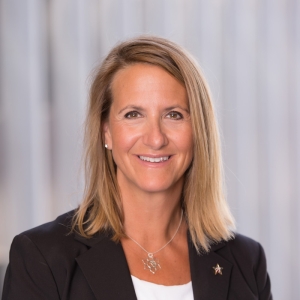DSW Graduate Tina Atherall Finds Power in Community
September 13, 2018 / by Jacqueline Mazarella- Alumni
When her husband was stationed at Marine Corps Base Camp Lejeune in North Carolina in 2006, Tina Atherall witnessed firsthand the effects post-9/11 action in Iraq and Afghanistan had on service members and their families. It inspired her to co-found the nonprofit Hope for the Warriors to assist with the needs of family members and those who had been wounded or killed in action.
Atherall realized quickly that she knew her military community really well, but she did not have the professional skills to support the complex issues of those coming home from long-term combat, multiple deployments and how that also affected their families. So she enrolled in graduate school and received her MSW in 2010.
“I look back at it now and the timing was perfect because there weren't a lot of social workers doing this work in the early years of post-9/11 combat,” Atherall said.
Stepping up her game
Around the time she was completing her degree, Atherall learned that the USC Suzanne Dworak-Peck School of Social Work was becoming a leader in military social work. She jumped at the opportunity to help mentor students―other military spouses and service members who were transitioning out of service and wanted to be in the field because they saw it as a catalyst for real change.
“I loved the education part,” Atherall said. “I loved the mentoring, I loved being in a field placement agency. I loved growing and defining the next generation of military social workers.”
Atherall eventually left her nonprofit to teach clinical and military social work. When she decided to pursue a Doctor of Social Work, she chose USC because of its leadership, macro-practice-based program and commitment to military social work. Once accepted, Atherall made a purposeful career change, accepting a position at Blue Star Families, which connects military families to their neighbors and community organizations, so she could develop and implement a capstone project for her degree, tackling social isolation among military families.
“It was taking an opportunity to influence [an already] funded project with the innovative practices of the DSW program,” Atherall said.
Putting it in motion
She started as a project manager and is now leading Blue Star Families as its national director of community solutions, implementing, evaluating and scaling a pilot of her capstone project, Connected Communities, which received nearly $747,000 from Bristol-Myers Squibb to create solutions that address the root cause of military families’ social, mental health and financial readiness issues. Atherall views social isolation as a public health threat and eventually would like to apply what she has learned in the military community to other communities.
“I would love to be able to apply this model to the immigrant community,” said Atherall, who received her DSW in 2018. “Social mentorship programs allow for civilians that are embedded in a community to help connect those people who are new to their community.”
Because her studies overlapped with her professional responsibilities, she had mentors supporting her all the way. The experience taught her a lot about investing in an advanced degree and in choosing a school with an impressive network.
“I am so grateful for my fellow DSW graduates who aligned with and supported me,” Atherall said. “The ‘sweet sixteen’―that's what they call our pioneer cohort―are family for life.”
To reference the work of our faculty online, we ask that you directly quote their work where possible and attribute it to "FACULTY NAME, a professor in the USC Suzanne Dworak-Peck School of Social Work” (LINK: https://dworakpeck.usc.edu)
